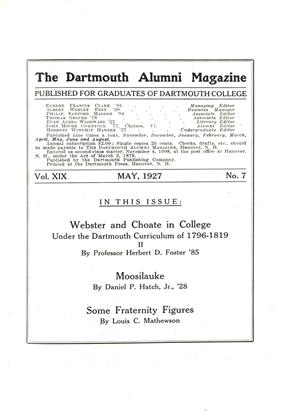(From The Boston Post)
The letter of President Hopkins of Dartmouth is plainly the opening gun in the long expected campaign against present-day college football. Coming from the head of a college that has a football reputation second to none in the country, it carries particular force and authority.
Its meaning is unmistakable. While President Hopkins appeals only for the "reform ' of the game, his ideas, carried into effect, would destroy football as the great national college spectacle. Football as carried out under the Hopkins system, would be a pleasant and interesting pastime for college students. The great public interest, which has made football the financially profitable game it has become, and made national figures of great football players, would disappear.
There is no doubt that this is precisely the result aimed at by President Hopkins.
There is much to be said in favor of his side of the case. Football has assumed an enormous importance in college life. The game has always been the one sport whose development has depended solely on the colleges. More than any one thing it has focussed the attention of the public on the colleges. The receipts from football, due to the steaming up of public interest in the game, have carried almost the entire burden, of college athletic expenses. Football, directly and indirectly, has been a "gold mine" for many schools.
It is natural for educators to resent the prominent place given to a mere sport. They would be pleased to see a genuine interest in college ideals on the part of the public, but are chagrined to find the public, or a great portion of it, chiefly interested in the prowess of the college football elevens. Some of them think it reduces the spectacular games between warm college rivals to the hippodrome level of a bull fight.
When they talk of "reforming" football they mean minimizing its importance. They are not concerned with the mere changing of rules. They will never be satisfied until football is confined, as it was 25 years ago, to the college undergraduates, with a sprinkling of old "grads" interested in the game for the game's sake. While they do not say so frankly they would like to exclude the general public.
If the majority of college presidents fall in with the suggestions of President Hopkins, then college football, as a great national sport, is finished. They have the power to put an end to it, and, doubtless, many of them have that desire. But the opposition will be tremendous.
No doubt the vast majority of college alumni will rise in defence of the game. No sport has more loyal followers. Even those who admit that certain evils have crept into the sport will hardly believe these things warrant virtual suppression of football. Football is the one college sport that has firmly fixed traditions. The men remembered longest in after years are the football heroes. A blow at football strikes right at the heart of the average "old grad."
However, even the most powerful hand of alumni could hardly prevail against the united will of the presidents of 25 or 30 of the leading universities and colleges.
If they turn thumbs down on college football, then its future is a dark one.
 View Full Issue
View Full Issue
More From This Issue
-
 Article
ArticleWEBSTER AND CHOATE IN COLLEGE
May 1927 By Herbert Darling Foster '85 -
 Article
ArticleTHE UNDERGRADUATE CHAIR
May 1927 -
 Article
ArticleMOOSILAUKE
May 1927 By Daniel P. Hatch, Jr. '28 -
 Article
ArticleSOME FRATERNITY FIGURES
May 1927 By Louis C. Mathewson -
 Article
ArticleDARTMOUTH STUDENTS SAID TO BE IRRELIGIOUS
May 1927 -
 Class Notes
Class NotesClass of 1921
May 1927 By Herrick Brown








